Ditapis dengan
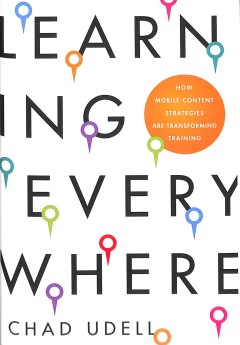
Learning Everywhere
Once the decision to go mobile has been made in a learning organization, at first glance it may seem as though the hardest decision has been made. Soon after this path is chosen, though, reality sets in. There are a lot of things to consider as you work to build your initial learning content for the many varieties of mobile devices. From strategy and design, to development, delivery and beyond,…
- Edisi
- -
- ISBN/ISSN
- 978-1-60544-017-0
- Deskripsi Fisik
- 287 p., ; illus : 24 cm ; index
- Judul Seri
- -
- No. Panggil
- MG UDE l
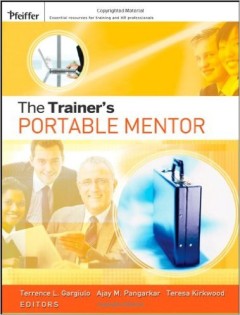
The trainer's portable mentor
This highly accessible, comprehensive resource shares the passions and key lessons from an all-star cast of respected training professionals. The authors covers a range of training topics, from designing, writing, delivering, measuring, and managing training to developing business acumen. They have divided the book into five sections (Designing Training, Delivering Training, Workforce Performan…
- Edisi
- -
- ISBN/ISSN
- 978-0-7879-9428-0
- Deskripsi Fisik
- xxiii, 663 p., ; illus : 23 cm ; index
- Judul Seri
- -
- No. Panggil
- TXT MG GAR t
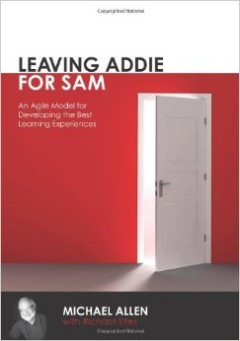
Leaving Addie for SAM: An Agile Model for Developing the Best Learning Experi…
The ADDIE process is past its prime. It was developed long before Agile and other iterative processes that have introduced greater efficiencies in design and development, fostered more creativity, and addressed effective stakeholder involvement. Leaving ADDIE for SAM introduces two new concepts?SAM, the Successive Approximation Model, and the Savvy Start. Together, they incorporate contemporary…
- Edisi
- -
- ISBN/ISSN
- 978-1-56286-711-9
- Deskripsi Fisik
- xiii, 202p. ; 26cm.
- Judul Seri
- Leaving Addie for Sam
- No. Panggil
- TXT MG All l
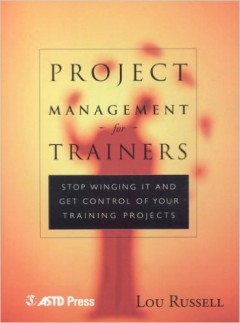
Project Management for Trainers : Stop Winging It and Get Control of your Tra…
Learn how to plan and organize any training project-AND control its time, cost, quality, and scope-with this fast-paced and highly readable book. Read solutions you can use immediately to build flexible project management plans, estimate required work effort, schedule steps and allocate resources, communicate project status, and perform a post-project review.
- Edisi
- -
- ISBN/ISSN
- 978-1-56286-141-4
- Deskripsi Fisik
- xi, 146p. ; 26cm.
- Judul Seri
- -
- No. Panggil
- TXT MG RUS p
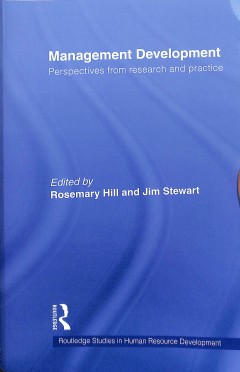
Management Development : Perspectives from Research and Practice
Recognizing a significant need to continually update the current body of knowledge on management development with the latest innovations in high quality research and practice in various parts of the globe, this book provides the most comprehensive and up-to-date work on the state of research and practice in management development. Hill and Stewart provide examples of both management developmen…
- Edisi
- -
- ISBN/ISSN
- 978-0-415-54166-4
- Deskripsi Fisik
- xxi, 337 p., ; illus : 23 cm ; index
- Judul Seri
- -
- No. Panggil
- TXT MG ROS m
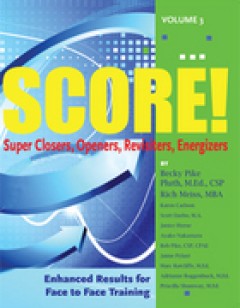
Score Volume 3 : Super Closers, Openers, Revisiters, Energizers
Don't leave money sitting on the table! So many trainers open with housekeeping details or close with an off-hand remark about running late. Yet the opening and closing of your workshops are critical training real estate! Time is money and wasting opportunities like this is like leaving money on the table. This latest edition of the SCORE! series brings you more than 50 new, never before publis…
- Edisi
- -
- ISBN/ISSN
- 978-0-9896615-0-8
- Deskripsi Fisik
- 136p. ; 28cm.
- Judul Seri
- SCORE
- No. Panggil
- TXT MG PIK s
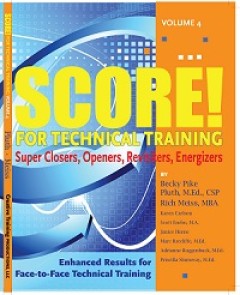
Score volume 4 : for Technical Training, Super Closers, Openers, Revisiters,…
Don't Be Dull! There is no boring content, only boring presenters! The perception of boring content, especially in technical training, is a result of presenters not sharing with their learners what is in it for them and then choosing a dull and dry format with which to present the information. Once you have shown your learners how their lives, jobs, work performance, environment or safety can b…
- Edisi
- -
- ISBN/ISSN
- 978-0-9896615-1-5
- Deskripsi Fisik
- 125p.; 28cm.
- Judul Seri
- SCORE
- No. Panggil
- TXT MG PIK s
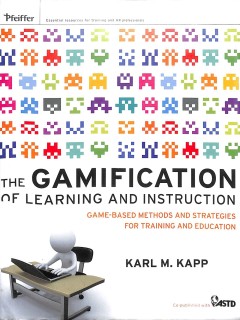
The Gamification of Learning and Instruction: Game-based Methods and Strategi…
Learning professionals are finding success applying game-based sensibilities to the development of instruction. This is the first book to show how to design online instruction that leverages the best elements of online games to increase learning, retention, and application. It explains how to match different game strategies to types of learning content for the right learning outcome and discuss…
- Edisi
- -
- ISBN/ISSN
- 978-1-118-09634-5
- Deskripsi Fisik
- xxxiii, 301p. ; 24cm.
- Judul Seri
- The Gamification
- No. Panggil
- TXT MG KAP t
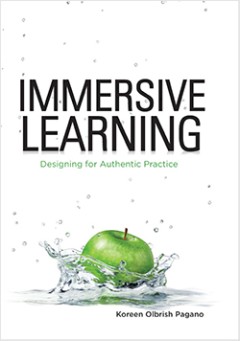
Immersive Learning: Designing for Authentic Practice
Immersive Learning: Designing for Authentic Practice focuses on how to design immersive learning environments and how these design practices differ from traditional instructional design processes. Traditional instruction often amounts to providing information to the learners without the opportunity to use what they learn. Immersive learning creates practice opportunities for the learners, which…
- Edisi
- -
- ISBN/ISSN
- 978-1-56286-821-5
- Deskripsi Fisik
- 183 p., ; illus : 26 cm
- Judul Seri
- -
- No. Panggil
- TXT MG PAG i

Establishing an order allocation decision support system via learning curve m…
Apparel firms confront the problem with effective order allocation among factories when conducting global logistics operations. The problem is non-deterministic polynomial-time hard and often complicated to obtain an optimal solution. This research tried to solve, by heuristic method, the problem via applying the learning curve to the capacity planning to improve the decision-making on global l…
- Edisi
- Vol. 31, No. 5, 274–285
- ISBN/ISSN
- -
- Deskripsi Fisik
- 13 p.
- Judul Seri
- Journal of Industrial and Production Engineering
- No. Panggil
- ATC LO CHE e

Process Metaphor And Knowledge Management
This paper attempts to develop a metaphor to explain knowledge and perhaps the basic construct of knowledge management, in a way that might add to the practical understanding of organisational knowledge.
- Edisi
- Vol. 34 No. 6 2005
- ISBN/ISSN
- 0368-492X
- Deskripsi Fisik
- 14 p
- Judul Seri
- -
- No. Panggil
- ATC MG ROW p

Managing Organizational Knowledge As A Strategic Asset
Knowledge is a resource that is valuable to an organization's ability to innovate and compete. It exists within the individual employees, and also in a composite sense within the organization. According to the resourcebased view of the firm (RBV), strategic assets are the critical determinants of an organization's ability to maintain a sustainable competitive advantage. This paper will combine …
- Edisi
- Vol. 5 No. 1 2001
- ISBN/ISSN
- 1367-3270
- Deskripsi Fisik
- 20 p
- Judul Seri
- Jurnal of Knowledgw Management
- No. Panggil
- ATC MG BOL m

Five Critical Knowledge Management Organizational Themes
This study is motivated by the question ‘‘how do organizational routines influence the three knowledge management processes of acquisition, creation, utilization and sharing?’’ and accordingly it seeks to address this issue.
- Edisi
- Vol. 14 No.4 2010
- ISBN/ISSN
- 1367-3270
- Deskripsi Fisik
- 17 p
- Judul Seri
- -
- No. Panggil
- ATC MG PET f

Dilemmas in Knowledge Management
This paper aims to discuss some of the debates that have surrounded knowledge management as a field since its inception in 1990s from the perspective of the dilemmas that they have raised regarding: the notion of knowledge management as a field in relationship to other cognate fields such as information management, and the implications introduced by different approaches and perspectives on mana…
- Edisi
- Vol. 29 No. 4/5 2008
- ISBN/ISSN
- 0143-5124
- Deskripsi Fisik
- 24 p
- Judul Seri
- Library Management
- No. Panggil
- ATC MG VAS d
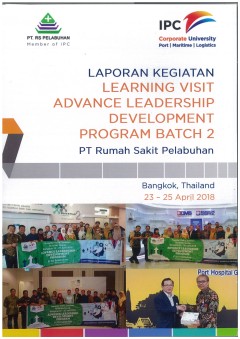
Laporan kegiatan learning visit advance leadership development program batch …
- Edisi
- 23-25 April 2018
- ISBN/ISSN
- -
- Deskripsi Fisik
- IV, 45p, 29 cm
- Judul Seri
- -
- No. Panggil
- IPC REP 2018 PEN l
- Edisi
- 23-25 April 2018
- ISBN/ISSN
- -
- Deskripsi Fisik
- IV, 45p, 29 cm
- Judul Seri
- -
- No. Panggil
- IPC REP 2018 PEN l

Learning Visit advance leadershep development program PT rumah sakit pelabuhan
- Edisi
- 12-14 Maret 2018
- ISBN/ISSN
- -
- Deskripsi Fisik
- IV, 34p, 29 cm
- Judul Seri
- -
- No. Panggil
- IPC REP 2018 PEN l
- Edisi
- 12-14 Maret 2018
- ISBN/ISSN
- -
- Deskripsi Fisik
- IV, 34p, 29 cm
- Judul Seri
- -
- No. Panggil
- IPC REP 2018 PEN l

Knowledge development and transfer in a mindful projectorganization
- Edisi
- Vol. 6 Iss 2 pp. 236 - 250
- ISBN/ISSN
- 1753-8378
- Deskripsi Fisik
- 18 p.
- Judul Seri
- International Journal of Managing Projects in Business
- No. Panggil
- ATC MG AND k
- Edisi
- Vol. 6 Iss 2 pp. 236 - 250
- ISBN/ISSN
- 1753-8378
- Deskripsi Fisik
- 18 p.
- Judul Seri
- International Journal of Managing Projects in Business
- No. Panggil
- ATC MG AND k

Know ways in knowledge management
- Edisi
- Vol. 12 Iss 2 pp. 152 - 168
- ISBN/ISSN
- 0969-6474
- Deskripsi Fisik
- 19 p.
- Judul Seri
- The Learning Organization
- No. Panggil
- ATC MG BLA k
- Edisi
- Vol. 12 Iss 2 pp. 152 - 168
- ISBN/ISSN
- 0969-6474
- Deskripsi Fisik
- 19 p.
- Judul Seri
- The Learning Organization
- No. Panggil
- ATC MG BLA k

Five critical knowledge management organizational themes
- Edisi
- VOL. 14 NO. 4 2010, pp. 507-523
- ISBN/ISSN
- 1367-3270
- Deskripsi Fisik
- 17 p., + atc., 21 cm.
- Judul Seri
- JOURNAL OF KNOWLEDGE MANAGEMENT
- No. Panggil
- ATC MG SUN f
- Edisi
- VOL. 14 NO. 4 2010, pp. 507-523
- ISBN/ISSN
- 1367-3270
- Deskripsi Fisik
- 17 p., + atc., 21 cm.
- Judul Seri
- JOURNAL OF KNOWLEDGE MANAGEMENT
- No. Panggil
- ATC MG SUN f

Knowledge and cultural diffusion along the supply chain as drivers of product…
The purpose of this paper is to widen the knowledge base on supply chain learning by exploring and explaining how an enterprise can compete and win in the international market by integrating quality management practices along its supply chain and, above all, by becoming the coordinator in a supply chain learning (SCL) network.
- Edisi
- Vol. 23 No. 2, 2012
- ISBN/ISSN
- -
- Deskripsi Fisik
- 29 p.
- Judul Seri
- -
- No. Panggil
- ATC MG BIO k

Knowledge and cultural diffusion along the supply chain as drivers of product…
The purpose of this paper is to widen the knowledge base on supply chain learning by exploring and explaining how an enterprise can compete and win in the international market by integrating quality management practices along its supply chain and, above all, by becoming the coordinator in a supply chain learning (SCL) network.
- Edisi
- Vol. 23 No. 2, 2012
- ISBN/ISSN
- -
- Deskripsi Fisik
- 29 p.
- Judul Seri
- The International Journal of Logistics Management
- No. Panggil
- ATC LO NON k

Management development through self managed learning : the case of West susse…
The Advanced Management Development Programme (AMDP) was introduced by West Sussex County Council, UK, in 1999. The programme runs in partnership with the University of Chichester, which offer a Post Graduate Diploma in Strategic Management on completion of the programme.
- Edisi
- VOL. 20 NO. 4 2006, pp. 16-18
- ISBN/ISSN
- 1477-7282
- Deskripsi Fisik
- 5 p.
- Judul Seri
- Development and Learning in Organizations : An International Journal
- No. Panggil
- ATC MG DAV m

Exploring and learning from the future : five steps for avoiding strategic s…
Why do organizations get blindsided by market transformations that could have been anticipated? After all, scenario planning has been a widely used strategic management tool for decades and most managers are familiar with the process of considering how they would operate in alternative futures. The reason most organizations get surprised by game-changing events, in my experience, is not that th…
- Edisi
- Vol. 37 Iss 2 pp. 27 - 31
- ISBN/ISSN
- 1087-8572
- Deskripsi Fisik
- 7 p.
- Judul Seri
- Strategy & Leadership
- No. Panggil
- ATC MR RAN e
NLP - skills for learning : a practical handbook for increasing learning pote…
- Edisi
- -
- ISBN/ISSN
- 978-87-403-0444-2
- Deskripsi Fisik
- 178 p.
- Judul Seri
- -
- No. Panggil
- TXT MG FRE n
- Edisi
- -
- ISBN/ISSN
- 978-87-403-0444-2
- Deskripsi Fisik
- 178 p.
- Judul Seri
- -
- No. Panggil
- TXT MG FRE n

Industrial engineering the Toyota Production System
The purpose of this paper is to examine the manifold linkages connecting the Toyota Production System (TPS) back to the Gilbreths and others, and to determine how these have contributed to enterprise-wide best practice. Industrial engineering (IE) theory rapidly subsumed method study and thereby made considerable contributions to output in World War II (WWII). The outcome is the positing of “…
- Edisi
- Vol. 16 No. 3, 2010
- ISBN/ISSN
- -
- Deskripsi Fisik
- 21 p .
- Judul Seri
- Journal of Management History
- No. Panggil
- ATC LO TOW i

Learning mechanisms for humanitarian logistics
As humanitarian organizations often operate in highly volatile environments, a good understanding of their learning mechanisms would improve the knowledge acquisition and retention in these organizations, and complement the formal logistics education and training for their relief staff. The paper explores the following research question: what learning mechanisms are used by humanitarian organiz…
- Edisi
- Vol. 3 No. 2, 2013 pp. 149-160
- ISBN/ISSN
- -
- Deskripsi Fisik
- 14 p.
- Judul Seri
- Journal of Humanitarian Logistics and Supply Chain Management
- No. Panggil
- ATC LO SOU l

Mastering logistics change
This article draws attention to the how of logistics management or logistics as part of the learning organization. The logistics discipline has advanced over the years, but these advances have been mainly on the what side, what could be done rather than how it is done. In a world of increasing opportunities, the restraining factor is increasingly how. New product and market strategies depend up…
- Edisi
- Vol. 8 Issue: 1, pp.45-54
- ISBN/ISSN
- -
- Deskripsi Fisik
- 12 p.
- Judul Seri
- The International Journal of Logistics Management
- No. Panggil
- ATC LO CAR m

Supply chain relationships as a context for learning leading to innovation
The purpose of this paper is to integrate the literature on learning in the context of boundary spanning innovation in supply chains. A two-dimensional framework is proposed: the learning stage (exploration, assimilation, exploitation) and the learning facet (structural, cultural, psychological and policy). Supply chain management (SCM) practices are examined in light of this framework and prop…
- Edisi
- Vol. 26 No. 3, 2015
- ISBN/ISSN
- -
- Deskripsi Fisik
- 27 p.
- Judul Seri
- The International Journal of Logistics Management
- No. Panggil
- ATC LO KNO s

Performance measurement: roles and challenges
The purpose of this paper is to identify the past and present practices, and the future roles of performance measurement in the Thai public sector. It is part of a transformation effort initiated by the Office of the Public Sector Development Commission (OPDC) on m-government – more mobile, responsive, and flexible government. The paper also aims to identify possible roadblocks from successfu…
- Edisi
- Vol. 109 No. 5, 2009
- ISBN/ISSN
- -
- Deskripsi Fisik
- 21 p.
- Judul Seri
- Industrial Management & Data Systems
- No. Panggil
- ATC LO DWI p

Mastery of operational competencies in the context of supply chain management
According to the most recent theories, the competitiveness of organizations is based on the development of competencies. Core competencies result from greater mastery than competitors of organizational abilities valued by customers. This paper seeks to investigate how a more thorough integration of the supply chain may be associated with greater mastery of operational competencies .
- Edisi
- Volume 14 · Number 1 · 2009 · 49–63
- ISBN/ISSN
- -
- Deskripsi Fisik
- 17 p.
- Judul Seri
- Supply Chain Management: An International Journal
- No. Panggil
- ATC LO HAL m

The role of knowledge management in facilitating learning in software organis…
Software organisations have been experiencing software development failures since the start of software development. These failures include among others abandoned and runaway projects, cost overruns, and low quality software. One of the major causes of software development failure is the inability of software organisations to learn from past mistakes. Many intervention strategies have been trie…
- Edisi
- -
- ISBN/ISSN
- -
- Deskripsi Fisik
- 9 p.
- Judul Seri
- -
- No. Panggil
- ATC MG SHO t

Learning management system
Looking for a fresh, interactive way to train your staff? A learning management system (LMS) can be used to support flexible learning opportunities for library staff. This article describes the benefits of using an LMS for staff onboarding, training, and professional development and overviews criteria for selecting an LMS appropriate for your public or academic library staff training needs.
- Edisi
- vol. 10, no. 2 (2015)
- ISBN/ISSN
- -
- Deskripsi Fisik
- 9 p.
- Judul Seri
- The Canadian Journal of Library and Information Practice and Research
- No. Panggil
- ATC MG SON s

Management development and the supply chain manager of the future
With the growing acceptance of logistics and supply chain management (SCM) as critical business concerns, there is an emerging realisation that more investment is needed to develop appropriate managerial skills and competencies for supply chain managers. This paper explores the challenges for management development that arise as organisations seek to bridge the gap between current capabilities …
- Edisi
- Vol. 16 No. 2, 2005
- ISBN/ISSN
- -
- Deskripsi Fisik
- 17 p.
- Judul Seri
- The International Journal of Logistics Management
- No. Panggil
- ATC LO CHR m

Development Radar- the co-configuration of a tool in a learning network
Purpose – The paper aims to argue that new tools are needed for operating, developing and learning in work‐life networks where academic and practice knowledge are intertwined in multiple levels of and in boundary‐crossing across activities. At best, tools for learning are designed in a process of co‐configuration, as the analysis of one tool, Development Radar, aims to demonstrate. …
- Edisi
- Vol. 21 No. 7, 2009
- ISBN/ISSN
- -
- Deskripsi Fisik
- 18 pages
- Judul Seri
- -
- No. Panggil
- ATC MR TOI d

Teaching supply chain and logistics management through commercial software
The purpose of this paper is to describe the development and teaching of graduate courses providing in-depth experiential learning employing commercial supply chain management software. The benefits of teaching such courses are described, the challenges in offering such courses are identified, and some solutions to overcome the challenges are offered
- Edisi
- Vol. 21 No. 2, 2010 pp. 293-308
- ISBN/ISSN
- -
- Deskripsi Fisik
- 18 p.
- Judul Seri
- The International Journal of Logistics Management
- No. Panggil
- ATC LO SWE t

Purchasing social responsibility and firm performance: The key mediating role…
This paper aims to examine how socially responsible supply management activities, a term labeled purchasing social responsibility (PSR) in the extant literature, affect a firm’s costs. There has been much debate, and mixed empirical findings, regarding whether socially responsible behavior on the part of companies improves or reduces firm performance.
- Edisi
- Vol. 35 No. 3, 2005 pp. 177-194
- ISBN/ISSN
- -
- Deskripsi Fisik
- 26 p.
- Judul Seri
- International Journal of Physical Distribution & Logistics Management
- No. Panggil
- ATC LO CAR p

Podcasting for e-learning, communication, and delivery
The purpose of this paper is to provide an overview of podcasting and webcasting, and to examine student preferences between the different delivery richness of communication media.
- Edisi
- Vol. 107 No. 4, 2007 pp. 587-600
- ISBN/ISSN
- -
- Deskripsi Fisik
- 17 p.
- Judul Seri
- Industrial Management & Data Systems
- No. Panggil
- ATC LO CAM p

Internationalization of professional service firms as learning – a construc…
Internationalization process research has conceptualized the cross-border move of firms as a process of learning. Yet, little attempts have been made to develop a constructivist learning theory of the internationalizing firm. The aim of this paper is to apply a contemporary learning theoretical framework to analyze the internationalization of professional service firms .
- Edisi
- Vol. 18 No. 2, 2007 pp. 140-151
- ISBN/ISSN
- -
- Deskripsi Fisik
- 14 p.
- Judul Seri
- International Journal of Service Industry Management
- No. Panggil
- ATC LO ALE i

Integrating service-learning and humanitarian logistics education
Humanitarian logistics is critical to providing relief to people in regions affected by hardship and disaster. This study examines literature on humanitarian logistics and service-learning and evaluates the integration of concepts.
- Edisi
- Vol. 3 No. 2, 2013 pp. 161-186
- ISBN/ISSN
- -
- Deskripsi Fisik
- 28 p .
- Judul Seri
- Journal of Humanitarian Logistics and Supply Chain Management
- No. Panggil
- ATC LO BUS i

Guest editorial: games for learning and dialogue on humanitarian work
The purpose of this guest editorial is to provide the introduction and context of the Special Issue on Games for Learning and Dialogue on Humanitarian Work. The Special Issue aims to promote the development, deployment, and analysis of games for the humanitarian sector: it investigates how games can meaningfully engage people and organizations in experiencing, understanding and improving comple…
- Edisi
- Vol. 5 No. 1, 2015 pp. 61-72
- ISBN/ISSN
- -
- Deskripsi Fisik
- 14 p.
- Judul Seri
- Journal of Humanitarian Logistics and Supply Chain Management
- No. Panggil
- ATC LO SUA g

Experiential learning in retrospect: a future organizational challenge?
The purpose of this paper is to describe a retrospective reflection over unconscious, emergent learning among employees of an organization and to suggest how to capture these moments of experiential learning for future organizational learning.
- Edisi
- Vol. 20 No. 6, 2008 pp. 431-442
- ISBN/ISSN
- -
- Deskripsi Fisik
- 14 p.
- Judul Seri
- Journal of Workplace Learning
- No. Panggil
- ATC LO OLS e

Critical success factors in e-learning ecosystems: a qualitative study
The purpose of this paper is to evaluate the critical success factors for sustainable e-learning in an e-learning ecosystem framework. Three critical components of the e-learning ecosystem including principles and methods, processes and systems, and substance and content are considered based on a comprehensive review of the relevant literature in e-learning.
- Edisi
- Vol. 12 No. 4, 2010 pp. 263-288
- ISBN/ISSN
- -
- Deskripsi Fisik
- 28 p .
- Judul Seri
- Journal of Systems and Information Technology
- No. Panggil
- ATC LO COR c

Collaborative learning in logistics and transport: The application of 3WIM
The article reports on the development of a collaborative learning method in two master’s level courses given as part of a logistics track within an international business degree programme. The method, termed the three‐way interaction method (3WIM), combines traditional case teaching and problem‐based learning through high intensity three‐way interaction between student groups. The me…
- Edisi
- Vol. 31 Issue: 7/8, pp.537-564
- ISBN/ISSN
- -
- Deskripsi Fisik
- 22 p.
- Judul Seri
- International Journal of Physical Distribution & Logistics Management
- No. Panggil
- ATC LO NIJ c

Changing perspective of capabilities in the dynamic supply chain era
A review of the literature reveals that previous research on capabilities has been limited to static capabilities and have largely been firm-centric, which neglect today’s evolving supply chain environment. To address this shortcoming, this paper aims to explore dynamic supply chain capabilities (DSCCS) as a path to achieving sustainable competitive advantage.
- Edisi
- Vol. 21 No. 2, 2010 pp. 180-206
- ISBN/ISSN
- -
- Deskripsi Fisik
- 30 p.
- Judul Seri
- The International Journal of Logistics Management
- No. Panggil
- ATC LO FUG c

An exploration of teaching methods used to develop leaders: Leadership educat…
The purpose of this paper is to explore how educators can benefit from data on teaching methods or sources of learning used for the leader development of undergraduate students. To advance the field, the authors contend that programs for leader development need to clearly identify what area of development is being improved (e.g. conceptual understanding, personal growth, skill building, feedbac…
- Edisi
- Vol. 36 No. 5, 2015 pp. 454-472
- ISBN/ISSN
- -
- Deskripsi Fisik
- 21 p .
- Judul Seri
- Leadership & Organization Development Journal
- No. Panggil
- ATC LO MIG a

Information processing and new product success: a meta-analysis
This paper aims to analyze and quantitatively compare existing empirical findings on the role of organizational information-processing and new product outcomes. The meta-analytic technique is used to reconcile some of the current divergent thinking on the role of organizational learning in new product success.
- Edisi
- Vol. 10 No. 2, 2007
- ISBN/ISSN
- -
- Deskripsi Fisik
- 29 p.
- Judul Seri
- European Journal of Innovation Management
- No. Panggil
- ATC LO STR i

Integrating service-learning and humanitarian logistics education
Humanitarian logistics is critical to providing relief to people in regions affected by hardship and disaster. This study examines literature on humanitarian logistics and service-learning and evaluates the integration of concepts.
- Edisi
- Vol. 3 No. 2, 2013
- ISBN/ISSN
- -
- Deskripsi Fisik
- 28 p .
- Judul Seri
- Journal of Humanitarian Logistics and Supply Chain Management
- No. Panggil
- ATC LO BUS i
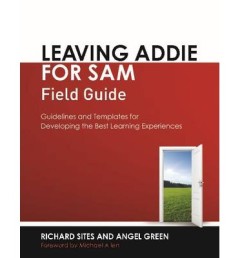
Leaving Addie for Sam Field Guide : Guidelines and Templates for Developing t…
Make your foray into successive approximations successful and as easy as possible. In the 2012 bestseller, Leaving ADDIE for SAM, learning professionals were introduced to the Successive Approximation Model (SAM) and the Savvy Start?the key to a successful project kick-off. Together, these concepts incorporate contemporary Agile processes that simplify design and development, yielding more ener…
- Edisi
- -
- ISBN/ISSN
- 978-1-56286-915-1
- Deskripsi Fisik
- xiii, 105p. ; 28cm.
- Judul Seri
- Leaving Addie for Sam
- No. Panggil
- TXT MG SIT l C.1
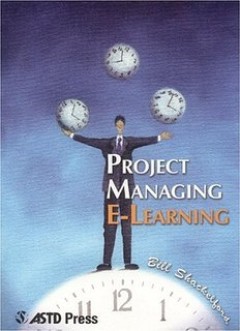
Project Managing E-Learning
Launching and managing a successful e-learning project is much easier when you use the proven steps and strategies in this practical guide. Learn how to avoid technical issues that can bring an e-learning project to a halt. Includes hands-on exercises and worksheets.
- Edisi
- -
- ISBN/ISSN
- 978-1-56286-329-6
- Deskripsi Fisik
- ix, 134p.; 26cm.
- Judul Seri
- -
- No. Panggil
- TXT MG SHA p
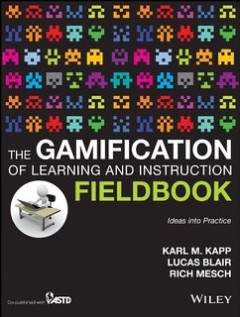
The Gamification of Learning and Instruction Fieldbook : Ideas into Practice
Following Karl Kapp's earlier book The Gamification of Learning and Instruction , this Fieldbook provides a step-by-step approach to implementing the concepts from the Gamification book with examples, tips, tricks, and worksheets to help a learning professional or faculty member put the ideas into practice. The Online Workbook, designed largely for students using the original book as a textbook…
- Edisi
- -
- ISBN/ISSN
- 978-1-118-67443-7
- Deskripsi Fisik
- xxxviii, 441p. ; 24cm.
- Judul Seri
- The Gamification
- No. Panggil
- TXT MG KAP t
 Karya Umum
Karya Umum  Filsafat
Filsafat  Agama
Agama  Ilmu-ilmu Sosial
Ilmu-ilmu Sosial  Bahasa
Bahasa  Ilmu-ilmu Murni
Ilmu-ilmu Murni  Ilmu-ilmu Terapan
Ilmu-ilmu Terapan  Kesenian, Hiburan, dan Olahraga
Kesenian, Hiburan, dan Olahraga  Kesusastraan
Kesusastraan  Geografi dan Sejarah
Geografi dan Sejarah